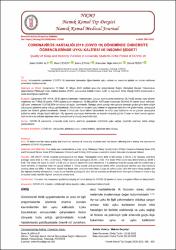| dc.contributor.author | İlhan Alp, Selen | |
| dc.contributor.author | Deveci, Meral | |
| dc.contributor.author | Akalın, Ramadan Bilgin | |
| dc.contributor.author | Terzi, Demet | |
| dc.contributor.author | Erdal, Berna | |
| dc.date.accessioned | 2022-05-11T14:10:17Z | |
| dc.date.available | 2022-05-11T14:10:17Z | |
| dc.date.issued | 2020 | |
| dc.identifier.issn | 2587-0262 | |
| dc.identifier.issn | 2587-0262 | |
| dc.identifier.uri | https://doi.org/10.37696/nkmj.752847 | |
| dc.identifier.uri | https://app.trdizin.gov.tr/makale/TkRFek1USTJOZz09 | |
| dc.identifier.uri | https://hdl.handle.net/20.500.11776/5351 | |
| dc.description.abstract | Amaç: Koronavirüs pandemisi (COVİD-19) sürecinde üniversite öğrencilerinin uyku kalitesi ve insomnia şiddeti ve bunları etkileyen etmenlerin belirlenmesidir.Materyal ve Metot: Çalışmamız 15 Mart- 31 Mayıs 2020 tarihleri arasında üniversitemiz Sağlık Hizmetleri Meslek Yüksekokulu öğrencilerine Pittsburgh Uyku Kalitesi İndeksi (PUKİ), Uykusuzluk Şiddet İndeksi (UŞİ) ve Algılanan Stres Ölçeği (ASÖ) kullanılarak eposta aracılığıyla yapılmıştır.Bulgular: Çalışmaya 446 (414 K, 32 E) öğrenci katılmıştır. Katılımcıların uykuya dalma süresi ortalaması 26,19±22 dakika, uyku süreleri ortalaması ise 7,98±2,10 saattir. PUKİ toplam puan ortalaması 15,69±2,96’dir. ASÖ puan ortalaması 30,94±8,46 olarak tespit edilmiştir. UŞİ puan ortalaması 10,87±5,35’tir ve düzeyi alt eşiğin üzerindedir. Sokağa çıkma yasağı olan grubun olmayan gruba göre daha düşük uykusuzluk şiddetine sahip olduğu görülmektedir. Alkol kullanımına göre uyku kalitesi ve algılanan stres farklılık göstermekte, uykusuzluk şiddeti ise farklılık göstermemektedir. Günde 2 fincandan fazla kahve tüketenlerin en kötü uyku kalitesine ve en yüksek uykusuzlukşiddetine sahip olduğu tespit edilmiştir. Hiç egzersiz yapmayan katılımcılar ve sosyal medyada günde 3 saat ve üzeri zaman geçiren katılımcıların en yüksek algılanan stres düzeyine sahip olduğu tespit edilmiştir.Sonuç: COVİD-19 pandemisi sırasında evde kalma şeklinde uygulanan tedbirlerin uyku sağlığı üzerinde olumsuz etkisi olduğu görülmektedir. | en_US |
| dc.description.abstract | Aim: To determine the sleep quality and insomnia severity of university students and the factors affecting them during the coronavirus pandemic (COVID-19) process. Materials and Methods: Our study was conducted by e-mail using Pittsburgh Sleep Quality Index (PSQI), Insomnia Severity Index (ISI) and Perceived Stress Scale (PSS) between 15 March and 31 May 2020 at our university's Health Services Vocational School. Results: 446 (414 F, 32 M) students participated in the study. Participants' mean time to fall asleep is 26.19 ± 22 minutes, and their average sleep time is 7.98 ± 2.10 hours. PSQI total score average is 15.69 ± 2.96. The mean PSS score was determined as 30.94 ± 8.46. The mean ISI score is 10.87 ± 5.35 and its level is above the lower threshold. It is observed that the group with the curfew has a lower severity of insomnia than the group without it. Sleep quality and perceived stress differ according to alcohol use, but insomnia severity does not differ. It has been found that those who consume more than 2 cups of coffee a day have the worst sleep quality and the highest severity of insomnia. It was found that the participants who did not exercise at all and those who spent 3 hours or more a day on social media had the highest perceived stress level. Conclusion: It is seen that measures applied as staying at home during the COVID-19 pandemic have a negative effect on sleep health. | en_US |
| dc.language.iso | tur | en_US |
| dc.identifier.doi | 10.37696/nkmj.752847 | |
| dc.rights | info:eu-repo/semantics/openAccess | en_US |
| dc.title | Coronavirüs Hastalığı 2019 (Covid 19) Döneminde Üniversite Öğrencilerinde Uyku Kalitesi ve İnsomni Şiddeti | en_US |
| dc.title.alternative | Quality of Sleep and Insomny Violence in University Students in the Period of COVID-19 | en_US |
| dc.type | article | en_US |
| dc.relation.ispartof | Namık Kemal Tıp Dergisi | en_US |
| dc.department | Meslek Yüksekokulları, Sağlık Hizmetleri Meslek Yüksekokulu, Tıbbi Hizmetler ve Teknikler Bölümü | en_US |
| dc.department | Meslek Yüksekokulları, Sağlık Hizmetleri Meslek Yüksekokulu, Çocuk Bakımı ve Gençlik Hizmetleri Bölümü | en_US |
| dc.department | Fakülteler, Tıp Fakültesi, Temel Tıp Bilimleri Bölümü, Tıbbi Mikrobiyoloji Ana Bilim Dalı | en_US |
| dc.identifier.volume | 8 | en_US |
| dc.identifier.issue | 3 | en_US |
| dc.identifier.startpage | 295 | en_US |
| dc.identifier.endpage | 302 | en_US |
| dc.institutionauthor | İlhan Alp, Selen | |
| dc.institutionauthor | Deveci, Meral | |
| dc.institutionauthor | Akalın, Ramadan Bilgin | |
| dc.institutionauthor | Terzi, Demet | |
| dc.institutionauthor | Erdal, Berna | |
| dc.identifier.trdizinid | TkRFek1USTJOZz09 | en_US |



















